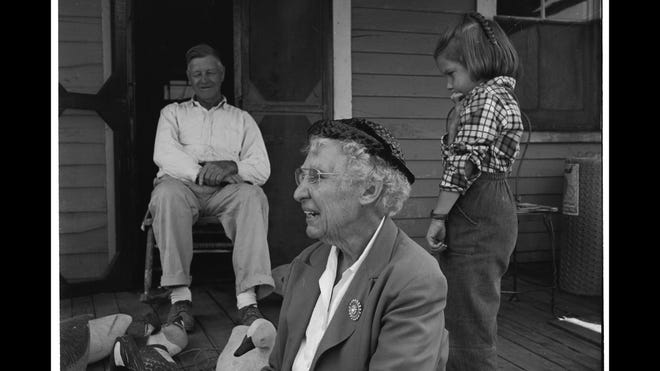Old people living at home, among family and community matters

A query to an online market watch caught my eye. The question posed was: "We want to retire in a place with low cost of living, no humidity and where it's no colder than 50 degrees. Where would you suggest?”
This is something of a coming-of-age question, if to mean that “other age” of when and where to retire. Given modern American standards, a fairly routine question.
Full-disclosure here, such has never been my question. As a farmer of the familial kind, my escape to some elderly Shangri-La has been intercepted by my blood-bond to my farm and its chance of a succeeding generation.
As I am entering the antique-tractor stage myself — not so much horsepower, a touch rusty and a little hard to start — I’m still good at chores notwithstanding the tendency to run out of gas.
It is generally acknowledged the farm vocation comes with a built-in retirement, as a tender of chickens, puller of weeds, the mower of the cemetery. Intrinsically a Hiawatha retirement plan, where we get to paddle off into the sunset with emphasis on paddle, meaning the chance to be semi-useful.
The Market Watch answer to the question of where to live was rather blunt; noting the retirement location defined as not too hot, not too cold was preemptively high-priced, and the place already taken.
Market Watch could have continued their answer to describe such sites zoologically, the look-alike cages where old people in sneakers can retire to a Valhalla that minds their medication, with an exercise class, shuffleboard, penny-a-point card games and — depending on the meds — some measure of alcohol afternoon euphoria.
I have long believed old people in particular should have the opportunity to practice mind-altering drugs solely for the purpose of low input recreation.
Market Watch did have some location suggestions: the Oregon coast, New Mexico, and if a few undiscovered spots remain in California. And if the ideal site can be slightly altered, there’s Georgia and North Carolina, where snow is possible and the possibility of summer humidity, but the prices aren’t bad and get even better if you don’t mind being an hour’s drive to a hospital. That elapsed time distance to the hospital may be a problem for some retirees.
To wonder why the presumptive rush to the fields of Avalon for perfect weather and low taxes when maybe living where you spent your life isn’t a bad option? We have all noticed what happens when a relative or neighbor goes off to their elder Eden and elements of a lifetime of community go with them — their presence at family events, weddings, funerals, Christmas.
Absent at graduations, picnics, cleaning fish, absent to the collection plate at the local church, the bowling alley, the Izaak Walton League, AWOL when it comes to child care, tutoring, fishing trips, motorcycle maintenance and potato harvest.
Making the elderly comfortable in their native born habitat is a social good as it is an economic opportunity because when they move to some Palo Alto they take their money and a severed family umbilical with them. Our home community is less, granted they may be in that idealized specimen jar with the right temp, taxes and humidity, but they aren’t where it matters.
I am a touch maudlin when it comes to my ancestors, when in former and obviously primitive times people retired in place and like as not still in harness.
My grandmother tended chickens even as dementia eroded her person. That flock, those imprinted chores, her egg money, while not curative was buffering. She occasionally forgot to latch the coop door, forgot the pail of eggs she just collected, but she did not die a potted plant. She didn’t die alone.

My Uncle Curtis, who in appearance closely resembled Winston Churchill — same sort of squat, bald, fire hydrant — if he did not smoke Romeo & Juliets. Uncle Curtis was severely arthritic, his locomotion was slightly less than glacial, he lived alone, made his meals, screwed up his meds, but was worth a million dollars to talk to on a rainy morning or sub-zero afternoon.
His primary health care consisted of putting oil heat in the house and to screw down the thermostat so he didn’t economize. Afternoons he’d somehow ooze down to his woodworking shop in the cellar to make grandfather clocks out of scrap lumber that as fates predict ended up as the most treasured kind of wedding or anniversary presents. He didn’t live long enough to fill out the customer list but gave it a good try.
Old people living at home, among family and community matters. Elderly care has an acute economic reality, so old people can not only thrive, and so can their communities. The question of where humidity is low and no colder than 50 degrees is not question enough.

Justin Isherwood of Plover is a fifth-generation farmer and the author of Book of Plough,Christmas Stones & The Story Chair, and Farm Kid: Tales of Growing Up in Rural America.